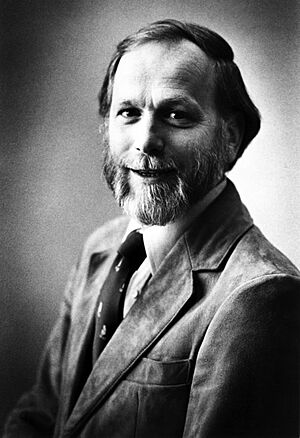J. Michael Bishop facts for kids
Quick facts for kids
J. Michael Bishop
|
|
|---|---|

Portrait of Bishop
|
|
| Born |
John Michael Bishop
February 22, 1936 York, Pennsylvania, U.S.
|
| Education | Gettysburg College (Bachelors) Harvard University (MD) |
| Known for | Oncogene Virus |
| Awards |
|
| Scientific career | |
| Fields | Virology |
| Institutions |
|
John Michael Bishop (born February 22, 1936) is an American scientist. He studies the body's defense system (an immunologist) and tiny living things like bacteria and viruses (a microbiologist). In 1989, he shared the Nobel Prize in Physiology and Medicine with Harold E. Varmus. This award is given for amazing discoveries in life sciences.
Dr. Bishop is still an active professor at the University of California, San Francisco (UCSF). He also served as the leader, or chancellor, of UCSF from 1998 to 2009.
Contents
Early Life and School
John Michael Bishop was born in York, Pennsylvania. He went to Gettysburg College for his first degree. Later, he studied at Harvard University Medical School. He earned his medical degree (MD) in 1962.
A Career in Science
Dr. Bishop started his science career at the National Institute of Allergy and Infectious Diseases. This is part of the National Institutes of Health in the U.S. He then worked for a year in Hamburg, Germany, at the Heinrich Pette Institute.
In 1968, he joined the University of California, San Francisco. He has been a professor there ever since. From 1998 to 2009, he was the chancellor of UCSF. He led the university during a time of big changes and growth. This included expanding the Mission Bay campus. He also created a plan to make the university a more welcoming place for everyone.
Discovering Cancer Genes
Dr. Bishop is famous for his work on oncogenes. These are genes that can cause cancer. He worked closely with Harold E. Varmus for many years.
Their most important discovery was finding a normal cell gene called c-src. This gene was similar to a cancer-causing gene found in a virus. This virus, called Rous Sarcoma Virus, was known to cause cancer in chickens.
Their discovery helped scientists understand how cancer starts. They learned that normal genes in our cells can change. These changes can turn them into cancer-causing genes. Viruses, radiation, or certain chemicals can cause these changes.
Awards and Special Honors
Dr. Bishop's Nobel Prize was for his work on retroviral oncogenes. He and Harold Varmus found the first human oncogene, called c-Src. Their findings helped explain how harmful tumors form. They learned that tumors come from changes to the normal genes inside a cell.
Dr. Bishop is a member of several important science groups. These include the National Academy of Sciences. In 2003, he received the National Medal of Science. This is one of the highest honors for scientists in the U.S. That same year, he published a book about his life in science. In 2008, he became a Foreign Member of the Royal Society.
In 2020, Dr. Bishop received the Clark Kerr Award. This award recognizes great leadership in higher education.
Images for kids
See also
 In Spanish: John Michael Bishop para niños
In Spanish: John Michael Bishop para niños
 | Bessie Coleman |
 | Spann Watson |
 | Jill E. Brown |
 | Sherman W. White |


